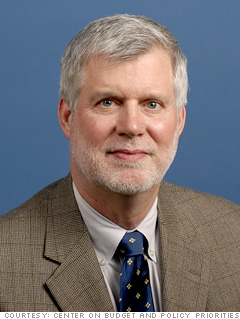
Director of federal fiscal policy, Center on Budget and Policy Priorities, a liberal economic policy group
What the president got right: The president sets an appropriate fiscal target -- stabilizing the debt as a share of the economy by reducing the deficit to 3 percent of gross domestic product and balancing the "primary" (non-interest) budget by 2015.
He proposes a number of steps that would help move toward this goal, including freezing funding for non-security programs for three years and making a number of changes on the tax side of the budget -- such as shutting down tax loopholes for oil and gas companies and letting tax cuts for very well-off Americans expire.
The president acknowledges that steps beyond those he proposes will be necessary to achieve his goal -- and calls for a bipartisan commission to develop such measures. But the proposals in his budget represent a significant step in the right direction.
He [also] reaffirms his commitment to enactment of health reform legislation containing measures that represent a crucial first step in the process of bringing the growth of health care costs under control. Because rising health care costs are the single biggest factor in the projected rapid growth of debt under current policies in coming decades, enacting such legislation is the by far the most important thing that Congress can do to deal with the nation's long-term fiscal imbalance.
What the president got wrong: While I don't think the budget is perfect in all respects, there is nothing at all major that I think he got wrong and needs to be highlighted.
NEXT: Commission worth try, but too many new initiatives
